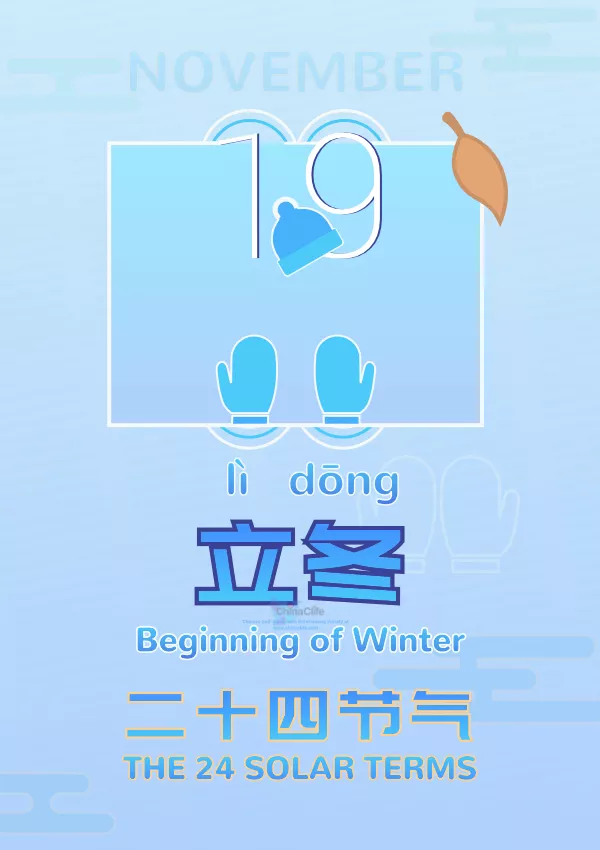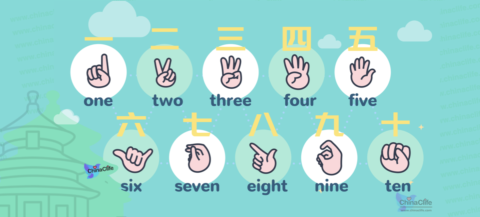LiDong: The 19th of Twenty-Four Solar Terms to Notify You About the Beginning of Winter in November
第 19 个节气:立冬
When the month of November approaches, it always comes at first the 19th term of China's Twenty-four Solar Terms, called "Li Dong". The story is going to introduce "Li Dong", also known as the "Beginning of Winter" in English.
Target Story Words
English Words:
Chinese Pinyin:
Standard Chinese:
Similar Chinese Words:
立春 lì chūn The beginning of Spring term in China's Twenty-four Solar Terms.
Related Chinese Words:
冬季 dōng jì The season name of Winter in Chinese.
十一月 shí yī yuè The month name of November in Chinese.
二十四节气 èr shí sì jié qì The Twenty-four Solar Terms in Chinese.
Table of Story
What is "Li Dong"?
立冬指什么?
The word "LiDong" comes from the pinyin form (lì dōng) of a Chinese term 立冬, also known as the Beginning of Winter in English.
Li Dong,取自中国的一个节气词汇“立冬”的汉语拼音,英文里也称作“Beginning of Winter”。
LiDong is the 19th term of the well-known Chinese Twenty Four Solar Terms, which is called "中国二十四节气" (èr shí sì jié qì) in Standard Chinese.
立冬,是中国二十四节气里的第 19 个 节气。

Each time when the sun moves to the 225 degrees (225°) of the ecliptic longitude, the time of the day was defined as the start time of the term Beginning of Winter, which was marked as 立冬 (lì dōng) on the Chinese calendar of the year.
每当太阳运行至位于黄经 225 度时,这一天的某个具体时刻则被定为节气“立冬”,在中国农历中这一天也会标记为“立冬”日。
LiDong is the 19th term of the well-known Chinese Twenty-Four Solar Terms which is called 中国的二十四节气 (lì dōng)
每当太阳运行至位于黄经 225 度时,这一天的某个具体时刻则被定为节气“立冬”,在中国农历中这一天也会标记为“立冬”日。
When is "Li Dong" in China?
立冬的日期?
In the Gregorian calendar, the Chinese Solar Term 立冬, the Beginning of Winter usually takes place in the early November, falling on November 7 or 8 depending on the movement of the sun and the traditional Chinese calendar, with an 1-or-2-day discrepancy.
在公历中,节气“立冬”对应的日期通常落在每年 11 月上旬的 7-8 日之间,误差不会超过 1 或 2 天。
Specifically, the date November 7th, 2022 at Beijing time 18:45 (UTC+8) comes the solar term of LiDong of the year, which will end on November 22th, 2022 at 16:20 (UTC+8) when the next solar term arrives.
2022年的雨水节气始于北京时间 11 月 7 日傍晚 18 时 45 分,止于 11 月 22 日 16 时 20 分,即下一个节气来临之时。
What Does "Li Dong" Mean?
“立冬”的含义
The Chinese term of "Li Dong" literally consists of two basic Chinese character: 立 and 冬. In modern times, the second 冬 (dōng) is simply known as the Winter season in Chinese language. And the first one 立 (lì) here as a Chinese verb means something is to be established. To merge them together, this term is going to notify the people that the Winter begins now.
从字面上看,“立冬”里包含的两个基础汉字:“立”和“冬”。其中,“冬”,在现代通常指冬天的季节。“立”在这里表示自此开始。合起来,即向人们预告着,冬季从此刻开始了。
Not only that, the term is not just telling about the start of winter. In ancient China, the character "冬" also contained the meaning of "end". When it appeared in the LiDong term, it gives an implication that the vital energy is restrained and stored, and all livings start turning into a status of hiding and resting, like the animals going into hibernation.
但立冬的含义并不仅指冬季的开始。在古代,“冬”字还表示“终了”的含义。出现在节气“立冬”里,也意味着生气开始闭蓄,万物进入休养、收藏、避冬的状态,如动物们开始藏起来冬眠。
To know more about China's Twenty-four Solar Terms with cultural customs, and looking for starting Chinese learning entertainingly, keep an eye on our updating at www.chinaclife.com.
欲了解更多关于中国的二十四节气及其文化习俗,并趣学中文,请随时关注我们的更新。
Enjoy!
Questions & Additional
Have you got any tips from this bilingual Chinese story above?
Do you have any other questions or suggestions?
You are free to write it down in the "Comments" section below or in our groups.
Any thought from you is appreciated, valuable, and might help the rest of the residents on the planet. 😀
Additionally...
Did You Start Learning Chinese with Pinyin?
Continue to read our User-friendly Chinese-Pinyin version of this story
(Unlocked for Free Logged-in and Premium residents only).
Hope it Helps! : )



















